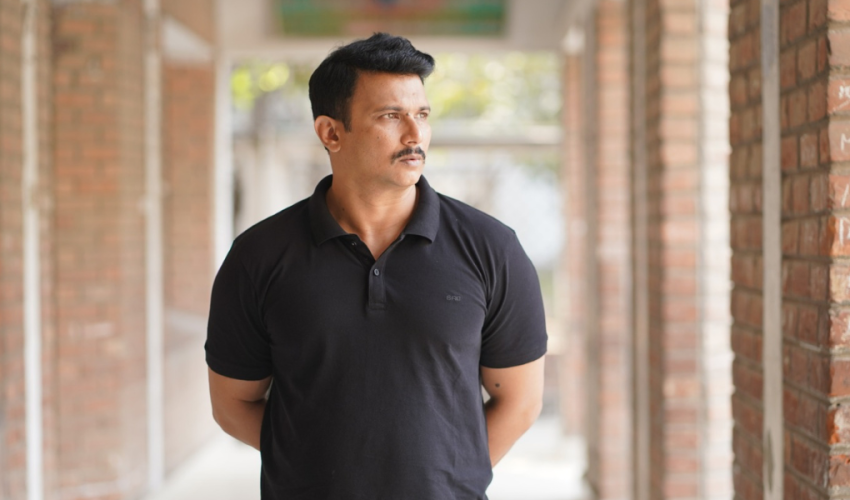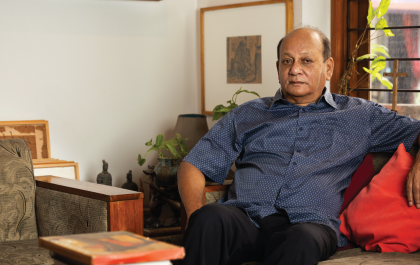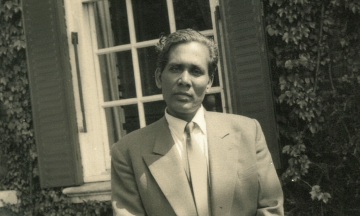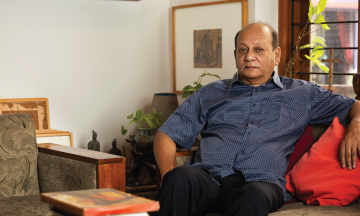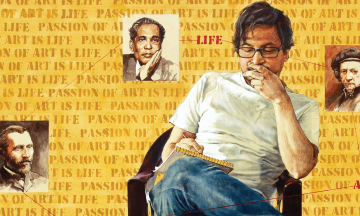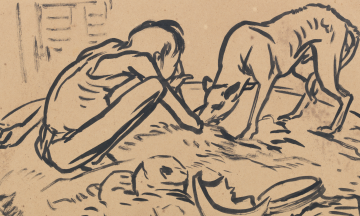He claimed the first Radar interview in the inaugural issue of MWB’s comeback. This month, we were on a mission to hunt down FS Nayeem for another quick update on his latest project
By Shams Nafiz
Can you give our audience a brief introduction about Mission Huntdown? We would love to know about its story, your character, and the overarching theme behind the series.
It’s an electrifying rollercoaster of a thriller. I’m breathing life into the character of Mahid, a police officer carrying the weight of his wife’s brutal murder, a painful event he witnessed first-hand. The story pulls you in with the search for a missing person that rapidly spirals into a national crisis. In essence, it’s a relentless pursuit of justice, a manhunt that justifies the series’ title.
The audience response so far has been nothing short of amazing, and I’m overjoyed to see our series dominating conversations this Eid season. It’s an honor to be part of the show that’s on everyone’s lips.
How did you get involved with Mission Huntdown? What attracted you to be a part of this project in the first place?
The creative forces driving this project are none other than Sunny Bhai (Sunny Sanwar) and Faisal Bhai (Faisal Ahmed). It all began when Sunny Bhai reached out to me. I then had a discussion with Hoichoi, a company with whom I’ve fostered a solid relationship since my time on Karagar. Sunny Bhai is incredibly meticulous; he crafts narratives that stay true to the original script all the way to the screen. He saw something unique in me, a different approach, a distinct personality within our industry, and I am happy that he believed in me.
I think it’s worth noting that this series may very well be a first for our industry, in that the plot is driven almost entirely by a single character. It was a gamble to tread that path, but I hope my portrayal has done justice to the compelling storyline. The feedback has been overwhelmingly positive, which makes me glad to see our hard work and the final product being appreciated.
How much input did you have in the development of your character and their arc in the series?
Not significantly. The script was so well-written, so precise, that it didn’t require much in terms of additional input from me. That said, I did propose crafting a certain aesthetic and vibe for my character that would set him apart. The aim was to lend an air of constant seeking, to ATS Chief Mahid, a sign that he is always on a quest for something. I believe this subtle characterization helped enhance his overall appeal and depth.
Was there any scene or episode in the series that was particularly challenging or fun to shoot? Can you share the story behind it?
There was an intriguing element to the action sequences, and that was the use of a real gun. Of course, safety was paramount, and at no point were live rounds involved. We meticulously adhered to safety protocols before and after each shot. But I must admit, using an actual firearm gave an extra layer of realism and helped me truly embody my character. And yes, the energy on set certainly spiked during these action-packed moments. There was a palpable sense of heightened alertness whenever I was filming those scenes.
If you could have a skillset of ATS Chief Mahid in your real life, what would it be and why?
Indeed, there are facets of Mahid that I find very admirable and wouldn’t mind adopting myself. His idealism, honesty, and dedication are traits that resonate deeply with me. I’ve mentioned in other interviews that if we had more people like Mahid in our society, we would undoubtedly have a much-improved quality of life.
But as humans, we’re susceptible to fall prey to various vices, be it envy, greed, pride, or something more destructive. Achieving true strength of character is no easy task, but Mahid encapsulates these virtues. He serves as an embodiment of focus, honesty, and undeterred dedication to his principles.
What makes you tick? What motivates you to be the professional actor that you are today?
My journey into acting started somewhat by chance. My first opportunity came in 2006 when I was cast in a Valentine’s special drama directed by Rumana Rashid Eshita. At that point, I viewed it more as a new adventure to embark on rather than a career path. Fast forward to 2008, when I was presented with another opportunity, this time to feature in a sports-based film. This served as a wake-up call, reminding me that as these opportunities were coming my way, it was high time I started taking things more seriously.
So, within just ten days, I left my eight-year-long job and took the leap into full-time acting, never to look back. It’s a strange truth that many of us don’t end up doing what we initially planned to do. But in my case, every bit of positive feedback I received for my performances motivated me to invest more in myself and my craft. It’s fair to say, then, that when opportunities knocked, I chose to rise to the occasion, continually striving to become the best version of myself as an actor.
How do you approach getting into character, and how does it vary with different roles?
I believe my approach to acting is something that can be applied to any field of work. Once you commit to a task, it’s important to dive into the nitty-gritty. For example, when I receive a script, I pore over it countless times until I’ve addressed all the questions and doubts I have regarding the project. Naturally, I consult with the director and assistant directors to better understanding my character. I carry the script with me constantly, revisiting it whenever I’m in the right frame of mind and mood.
From there, I do two things. First, I sculpt the character within the context of the given timeframe and outlook. Second, I remain open to new ideas and perspectives; I avoid falling into the trap of tunnel vision about how I want the character to be portrayed. It’s easy to overlook brilliant insights if you close yourself off to feedback. To ensure I maintain this openness, I spend a lot of time engaging with my crew members, not just professionally but also personally, to foster a sense of camaraderie.
Another tactic I employ is reading the script from the audience’s perspective. I first study and understand the other characters in the narrative before I turn my focus to my own character. It’s akin to market research. Just as you need to understand the wider context, trends, and influences when starting a business from scratch, to truly embody my character, I must understand the broader narrative and the roles others play within it.
Can you share an experience where a role you played had a significant impact on your personal life or views?
While I wouldn’t say that the characters I play cause substantial changes in my personal life, they certainly contribute to my growth as a human being. At times, I find myself so deeply immersed in a role that those close to me observe subtle shifts in my behavior. It might be a slight alteration in my usual mannerisms, my demeanor, perhaps a more introspective silence, or a change in my general approach to things. It’s clear to them that there’s a new thought process at work.
My philosophy is to take the best elements from each character I portray and incorporate them into my personal development, while leaving behind any traits that don’t serve me. This process, in a way, allows every role to become a part of my ongoing evolution.
What’s something about movies, TV shows, or visual media in general that you wish more people realized?
I firmly believe that many of us underestimate, or are simply unaware of, the profound impact that media has on society. It’s not just about mindlessly consuming content; the media is a mirror reflecting societal contexts and human behaviors, both positive and negative. A single scene can prompt us to reflect, challenge our views, or even alter our behavior and perceptions of life. It might inspire us to reconnect with someone we’ve lost touch with, to make changes that make us better individuals, or to become aware of issues previously outside of our radar. However, these transformative influences often go unrecognized in our day-to-day lives.
Conversely, there’s also the darker side to consider – content that harbors negativity can disrupt and negatively impact society. So, the responsibility falls on both ends – the audience should strive to be more discerning consumers, while those in the industry need to understand and respect the potential impact of their creative work. We must navigate this fine balance with care and consciousness.
.
What’s a unique or memorable piece of advice you think has helped you become who you are today?
From my early days, I’ve been an avid reader, regularly visiting the New Market area to buy lots of books and magazines. One of the many things that resonated deeply with me was a quote from Will Smith, which goes something like: “Don’t wear brands, be a brand yourself.” This idea left a profound impression on me, and it’s something I’ll carry with me for the rest of my life.
Since then, I’ve strived to be a person of value, someone others look up to, someone who can make the perceived underdogs feel like kings. This mindset has permeated all aspects of my life, from my personal conduct to my acting career.
I have a quote displayed on my Facebook wall: “Only being an actor, I live in every emotion and profession.” It’s a mantra that I consider a blessing to carry with me, as it encapsulates my journey and my perspective on my career beautifully.
So, what’s next for FS Nayeem?
I’m thrilled to share that there are several film and TV projects on the horizon for me. There are certain projects I’m particularly enthusiastic about, and in due time, all will be revealed. I’m really looking forward to what the rest of this year and the future hold for me in this industry. It’s an exhilarating time, and I can’t wait to continue this journey and share my work with everyone.
- tarin fatema
- tarin fatema
- tarin fatema
- tarin fatema
- tarin fatema
- tarin fatema
- tarin fatema
- tarin fatema
- tarin fatema
- tarin fatema
- tarin fatema
- tarin fatema




